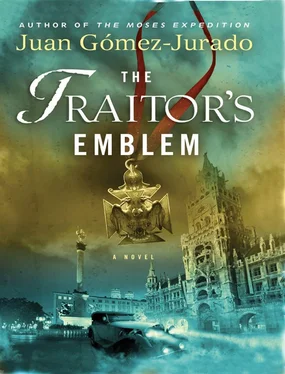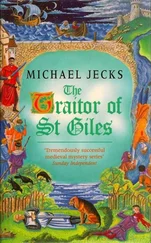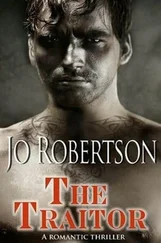Juan Gomez-Jurado - The Traitor's emblem
Здесь есть возможность читать онлайн «Juan Gomez-Jurado - The Traitor's emblem» весь текст электронной книги совершенно бесплатно (целиком полную версию без сокращений). В некоторых случаях можно слушать аудио, скачать через торрент в формате fb2 и присутствует краткое содержание. Жанр: Триллер, на английском языке. Описание произведения, (предисловие) а так же отзывы посетителей доступны на портале библиотеки ЛибКат.
- Название:The Traitor's emblem
- Автор:
- Жанр:
- Год:неизвестен
- ISBN:нет данных
- Рейтинг книги:4 / 5. Голосов: 1
-
Избранное:Добавить в избранное
- Отзывы:
-
Ваша оценка:
- 80
- 1
- 2
- 3
- 4
- 5
The Traitor's emblem: краткое содержание, описание и аннотация
Предлагаем к чтению аннотацию, описание, краткое содержание или предисловие (зависит от того, что написал сам автор книги «The Traitor's emblem»). Если вы не нашли необходимую информацию о книге — напишите в комментариях, мы постараемся отыскать её.
The Traitor's emblem — читать онлайн бесплатно полную книгу (весь текст) целиком
Ниже представлен текст книги, разбитый по страницам. Система сохранения места последней прочитанной страницы, позволяет с удобством читать онлайн бесплатно книгу «The Traitor's emblem», без необходимости каждый раз заново искать на чём Вы остановились. Поставьте закладку, и сможете в любой момент перейти на страницу, на которой закончили чтение.
Интервал:
Закладка:
“Ever been to Ayamonte, Roca?”
“No, sir,” said the young man, without turning round.
“It’s a charming place, three miles up the Guadiana. The wine is good, and in April it smells of orange blossom. And on the other bank of the river, that’s where Portugal starts.”
He took another sip.
“A stone’s throw, as they say.”
Roca turned, surprised. The captain gave him a tired smile.
Fifteen hours later, the deck of the Esperanza was deserted. Laughter rose from the mess, where the sailors were enjoying an early dinner. The captain had promised that after they’d eaten they would drop anchor at the port of Ayamonte, and many of them could already feel the sawdust of the tavernas under their feet. Supposedly the captain was minding the bridge himself while Roca guarded the four shipwrecked passengers.
“You’re sure this is necessary, sir?” asked the navigator, unconvinced.
“It will just be the tiniest bruise. Don’t be so cowardly, man. It has to look like the castaways attacked you in order to escape. Stay down on the floor for a bit.”
There was a dry thud and then a head appeared through the hatch, quickly followed by the castaways. Night was beginning to fall.
The captain and the German lowered the lifeboat into the water, to port, the side farthest from the mess. His companions climbed in and waited for their one-eyed leader, who had covered his head with his hood once more.
“Two hundred meters in a straight line,” the captain told him, gesturing toward Portugal. “Leave the lifeboat on the beach: I’ll need it. I’ll fetch it back later.”
The German shrugged.
“Look, I know you don’t understand a word. Here-” said Gonzalez, giving him back his knife. The man tucked it away in his belt with one hand while he fumbled under his raincoat with his other. He took out a small object and placed it in the captain’s hand.
“Verrat,” he said, touching his index finger to his chest. “Rettung,” he said next, touching the chest of the Spaniard.
Gonzalez studied the gift carefully. It was a sort of medal, very heavy. He held it closer to the lamp hanging in the cabin; the object gave off an unmistakable glow.
It was made of solid gold.
“Look, I can’t accept…”
But he was talking to himself. The boat was moving away already, and none of its occupants looked back.
To the end of his days, Manuel Gonzalez Pereira, former captain in the Spanish navy, dedicated every minute he could spare away from his bookshop to the study of that gold emblem. It was a double-headed eagle set on an iron cross. The eagle was holding a sword, and there was a number 32 above its head and an enormous diamond encrusted in its chest.
He discovered that it was a Masonic symbol of the highest rank, but every expert he spoke to told him that it had to be a fake, especially since it was made of gold. The German Masons never used noble metals for the emblems of their Grand Masters. The size of the diamond-as far as the jeweler was able to ascertain without taking the piece apart-made it possible to date the stone approximately to the turn of the century.
Often, as he sat up late into the night, the bookseller thought back to the conversation he’d had with the “One-Eyed Mystery Man,” as his little son, Juan Carlos, liked to call him.
The boy never tired of hearing the story, and he invented farfetched theories about the identity of the castaways. But what excited him most were those parting words. He had deciphered them with the help of a German dictionary, and he repeated them slowly, as though by doing so he might better understand.
“Verrat-treachery. Rettung-salvation.”
The bookseller died without ever having solved the mystery hidden in his emblem. His son Juan Carlos inherited the piece and became a bookseller in his turn. One September afternoon in 2002, an obscure old writer came by the bookshop to give a talk about his new work on Freemasonry. Nobody turned up, so Juan Carlos decided, in order to kill time and lessen his guest’s obvious discomfort, to show him a photo of the emblem. On seeing it, the writer’s face changed.
“Where did you get this photo?”
“It’s an old medal that belonged to my father.”
“Do you still have it?”
“Yes. Because of the triangle containing the number 32, we worked out that it was-”
“A Masonic symbol. Obviously a fake, because of the shape of the cross, and the diamond. Have you had it valued?”
“Yes. The materials are worth about 3,000 euros. I don’t know if it has any additional historical value.”
The writer looked at the piece for several seconds before replying. His lower lip trembled.
“No. Definitely not. Perhaps as a curiosity… but I doubt it. Still, I’d like to buy it. You know… for my research. I’ll give you 4,000 euros for it.”
Juan Carlos politely refused the offer, and the writer left, offended. He started coming to the bookshop on a daily basis, even though he didn’t live in the city. He pretended to rummage among the books, though in reality he spent most of the time watching Juan Carlos over the thick plastic frames of his glasses. The bookseller began to feel harassed. One winter night, on his way home, he thought he heard footsteps behind him. Juan Carlos hid in a doorway and waited. Moments later the writer appeared, an elusive shadow shivering in a threadbare raincoat. Juan Carlos emerged from the doorway and cornered the man, holding him up against the wall.
“This has to stop, do you understand?”
The old man started to cry and fell babbling to the ground, hugging his knees.
“You don’t understand, I have to have it…”
Juan Carlos softened. He accompanied the old man to a bar and set a glass of brandy in front of him.
“Right. Now, tell me the truth. It’s very valuable, isn’t it?”
The writer took his time before replying, studying the bookseller, who was thirty years his junior and six inches taller. Finally he gave up.
“Its value is incalculable. Though that’s not the reason I want it,” he said with a dismissive gesture.
“Why, then?”
“For the glory. The glory of discovery. It would form the basis for my next book.”
“On the piece?”
“On its owner. I’ve managed to reconstruct his life after years of research, digging around in fragments of diaries, newspaper archives, private libraries… the sewers of history. As few as ten very uncommunicative men in the world know his story. All of them Grand Masters, and I’m the only one with all the pieces. Though no one would believe me if I told them.”
“Try me.”
“Only if you’ll promise me one thing. That you’ll let me see it. Touch it. Just once.”
Juan Carlos sighed.
“All right. On the condition you have a good story to tell.”
The old man leaned over the table and began to whisper a story that had, till that moment, been passed from mouth to mouth between men who had sworn never to repeat it. A story of lies, of an impossible love, of a forgotten hero, of the murder of thousands of innocent people at the hands of one man. The story of the traitor’s emblem…
THE PROFANE
1919-21
Where understanding never goes beyond one’s own self
The symbol of the Profane is a hand held out, open, solitary but capable of grasping hold of knowledge.
1
There was blood on the steps of the Schroeders’ mansion.
When he saw it, Paul Reiner shuddered. It wasn’t the first time he’d seen blood, of course. Between early April and May 1919, Munich’s inhabitants had experienced in thirty days all the horror they’d managed to avoid in four years of war. In the uncertain months between the end of the empire and the proclamation of the Weimar Republic, countless groups had attempted to impose their agendas. The Communists had taken the city and declared Bavaria a Soviet republic. Lootings and murders had become widespread as the Freikorps narrowed the gap between Berlin and Munich. The rebels, knowing their days were numbered, tried to get rid of as many political enemies as they could. Mostly civilians, executed in the dead of night.
Читать дальшеИнтервал:
Закладка:
Похожие книги на «The Traitor's emblem»
Представляем Вашему вниманию похожие книги на «The Traitor's emblem» списком для выбора. Мы отобрали схожую по названию и смыслу литературу в надежде предоставить читателям больше вариантов отыскать новые, интересные, ещё непрочитанные произведения.
Обсуждение, отзывы о книге «The Traitor's emblem» и просто собственные мнения читателей. Оставьте ваши комментарии, напишите, что Вы думаете о произведении, его смысле или главных героях. Укажите что конкретно понравилось, а что нет, и почему Вы так считаете.












